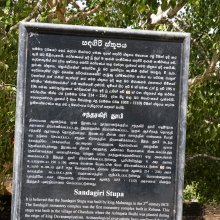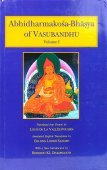Ven, Veṇ, Veṉ, Vēṇ, Vēṉ: 8 definitions
Introduction:
Ven means something in Hinduism, Sanskrit, biology, Tamil. If you want to know the exact meaning, history, etymology or English translation of this term then check out the descriptions on this page. Add your comment or reference to a book if you want to contribute to this summary article.
Images (photo gallery)
Biology (plants and animals)
Source: Google Books: CRC World Dictionary (Regional names)Ven in Dahomey is the name of a plant defined with Pterocarpus erinaceus in various botanical sources. This page contains potential references in Ayurveda, modern medicine, and other folk traditions or local practices It has the synonym Lingoum erinaceum (Poir.) Kuntze (among others).
Example references for further research on medicinal uses or toxicity (see latin names for full list):
· Phytomedicine (1999)
· Familles des Plantes (1763)
· Prodromus Systematis Naturalis Regni Vegetabilis (1825)
· Journal of Ethnopharmacology (2005)
· Journal of Ethnopharmacology (2007)
· Economic Botany (1964)
If you are looking for specific details regarding Ven, for example diet and recipes, chemical composition, extract dosage, health benefits, side effects, pregnancy safety, have a look at these references.

This sections includes definitions from the five kingdoms of living things: Animals, Plants, Fungi, Protists and Monera. It will include both the official binomial nomenclature (scientific names usually in Latin) as well as regional spellings and variants.
Languages of India and abroad
Sanskrit dictionary
Source: DDSA: The practical Sanskrit-English dictionaryVeṇ (वेण्) or Ven (वेन्).—1 U. (veṇati-te, venati-te)
1) To go, move.
2) To know, recognize, perceive.
3) To reflect, consider.
4) To take.
5) To play on an instrument.
6) To see.
7) To praise, worship.
--- OR ---
Ven (वेन्).—1 U. (venati-te) See वेण् (veṇ).
Source: Cologne Digital Sanskrit Dictionaries: Shabda-Sagara Sanskrit-English DictionaryVeṇ (वेण्).—[(ṛ)veṇṛ] r. 1st cl. (veṇati-te) 1. To go, to move. 2. To know. 3. To reflect or remember. 4. To discern. 5. To hold or take a musical instrument. 6. To play on an instrument. 7. To take. The root is also read vena .
--- OR ---
Ven (वेन्).—r. 1st cl. (venati-te) To go, &c.: see veṇ .
Source: Cologne Digital Sanskrit Dictionaries: Benfey Sanskrit-English DictionaryVeṇ (वेण्).—see ven.
--- OR ---
Ven (वेन्).—† veṇ VeṆ, i. 1, [Parasmaipada.] [Ātmanepada.] 1. † To go. 2. † To know. 3. † To reflect. 4. † To discern. 5. † To hold or take a musical instrument. 6. † To play on a musical instrument. 7. † To take. 8. To praise (ved.). 9. To love,
— Cf.
Source: Cologne Digital Sanskrit Dictionaries: Cappeller Sanskrit-English DictionaryVen (वेन्).—venati long for, desire; be envious or jealous.
Source: Cologne Digital Sanskrit Dictionaries: Monier-Williams Sanskrit-English Dictionary1) Veṇ (वेण्):—([probably] artificial; cf. √ven),
—to go, move;
—to know;
—to think;
—to discern;
—to play on an instrument;
—to hold or take, [Dhātupāṭha xxi, 13.]
2) Ven (वेन्):—(in, [Dhātupāṭha xxi, 13] [varia lectio] for veṇ q.v.) [class] 1. [Parasmaipada] venati, to care or long for, be anxious, yearn for, [Ṛg-veda; Śatapatha-brāhmaṇa];
2) —to tend outwards (said of the vital air), [Aitareya-brāhmaṇa];
2) —to be homesick, [Taittirīya-brāhmaṇa];
2) —to be envious or jealous, [Ṛg-veda] ([according to] to [Naighaṇṭuka, commented on by Yāska ii, 6 and 14] also ‘to go’ and ‘to worship’).
Source: Cologne Digital Sanskrit Dictionaries: Yates Sanskrit-English DictionaryVen (वेन्):—venati 1. a. To go. See veṇa.
[Sanskrit to German]
Sanskrit, also spelled संस्कृतम् (saṃskṛtam), is an ancient language of India commonly seen as the grandmother of the Indo-European language family (even English!). Closely allied with Prakrit and Pali, Sanskrit is more exhaustive in both grammar and terms and has the most extensive collection of literature in the world, greatly surpassing its sister-languages Greek and Latin.
See also (Relevant definitions)
Starts with (+661): Vemda, Vemkada, Vemkataramana, Vemtane, Vemtanisu, Vemtara, Vemte, Vemteya, Vemthanisu, Vemti, Vemtisu, Ven korai, Ven kottam, Ven poosani, Ven-chittira mulam, Ven-cilaicelvan, Ven-cirukatuku, Ven-cukkankal, Ven-cutaikunru, Ven-cutarkiranan.
Ends with (+74): Accaraven, Accariven, Agasavatteven, Alaven, Aliven, Amarduven, Anuven, Apaven, Aradiven, Araven, Aremeyven, Areven, Attuven, Bacceven, Badaven, Baddeven, Bagguven, Barduven, Baseven, Bayakeven.
Full-text (+329): Ven-parkal, Vencarai, Anuven, Venpavai, Ven-cukkankal, Venkutai, Apaven, Venkavi, Venpaci, Venkoti, Venmattam, Tapoloka, Venkakkanam, Venu, Ven-venn ble, Vencamaram, Venkitaicci, Venman, Venava, Venkatan.
Relevant text
Search found 66 books and stories containing Ven, Veṇ, Veṉ, Vēṇ, Vēṉ; (plurals include: Vens, Veṇs, Veṉs, Vēṇs, Vēṉs). You can also click to the full overview containing English textual excerpts. Below are direct links for the most relevant articles:
The Bhikkhus Rules (by Bhikkhu Ariyesako)
Barter Or Trade < [Chapter 3 - Possessions And Offerings]
Appendix C < [Appendices]
Intruding On Families < [Chapter 4 - Right Livelihood For A Bhikkhu]
And He Guides His Brother, Nanda < [Forty-five Years Of Teaching]
The Noble Sangha Is Born < [Forty-five Years Of Teaching]
What Sets The Buddha Apart < [Forty-five Years Of Teaching]
Dhammapada (Illustrated) (by Ven. Weagoda Sarada Maha Thero)
The Buddha and His Teachings (by Narada Thera)
Vinaya Pitaka (1): Bhikkhu-vibhanga (the analysis of Monks’ rules) (by I. B. Horner)
The translation of the Pārājika rules < [Preface to the SuttaCentral edition]
Semantic tags < [Preface to the SuttaCentral edition]
General Preface < [Preface to the SuttaCentral edition]
The Great Buddhist Emperors of Asia (by Shibani Dutta)
Related products






